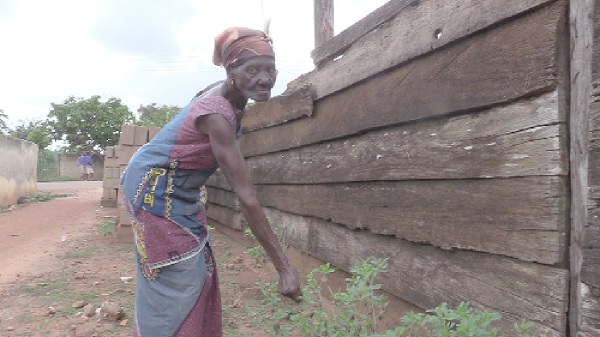
Torn between the devil and the deep blue sea; Dilemma of Maame Akua
In a room size of barely 1.5 metres by three metres sat an old woman called Maame Efua Nyarkoa.
The location is Nsaba in the Central Region, about three hours’ drive from Accra.
There was no electricity in the house though the village itself is on the grid.
Through a small window draped in dirty tattered lace, the sunlight seeped to provide some form of lighting into the room.
It was partly occupied by a wooden plank cushioned by some old cloths to serve as a bed.
The other obvious items were a portmanteau, old clothing and utensils.
Obviously movement and leg room in general were a luxury.
There was no sign of fire to indicate the preparation of meals, and a hostile environment very likely to have been caused by a quarrel was evident.
Children were warned not to gaze at visitors.
This old woman is the great grandmother of Maame Akua Owusua, the 18-year-old girl with a two-year old daughter who slept on the rails near the CMB in Accra.
Her story was published in The Mirror of June 26, 2021.

Zato Zato (arrowed), an old man in the neighbourhood who was perceived to be a friend of the bottle, kept asking Maame Akua (with child on lap) why she had abandoned her daughter in the village. Far left is Mrs Kyerewaa Asiamah Wiafe of the Corporate Communications Department of the Graphic Communications Group Ltd and Ms Doreen Hammond, Editor of The Mirror
Maame Akua had said that she hailed from Asankragwa in the Western Region and had no relatives apart from her grandmother whom she presumed dead.
The Mirror accompanied Maame Akua to her home to find out the conditions which drove her to the city.
It turned out that Maame only lived in Asankragwa for a while but actually hailed from Nsaba.
At Nsaba, it was difficult to read the emotions of this old woman as Maame Akua, who had left the village for a long time, walked in.
She embraced her and was ready to accommodate her but it was obvious there was no space for an additional person.
Maame Nyarkoa said she had given birth to 12 children, 10 of them daughters who had left for La Cote d’Ivoire to search for a source of livelihood at different times.
They have all since passed.

The village looked clean and the reason ascribed was the fear of sanitation inspectors who enforced the sanitation bye laws to the letter
As if the old lady’s predicament was not enough, Maame Akua’s uncle, Bra Kwame, was confined to a wheel chair.
On hearing that the team was from The Mirror, he asked for help, saying in Mfantse: “ monboa me, mon boa me, mere k3y3 operation, me hia sika”. To wit, I need help to have a surgery.
He narrated how at the age of 24, he left Nsaba for Nigeria to sell doughnuts (bofrot), which he said Nigerians called “puff puff” but had been brought back home as a physically challenged person after an accident since 2016.
He was now 38 years old and could not earn any income as a result of his incapacitation.
His wheel chair was donated by a church.
His mother, who sold anything she could lay hands, was his benefactor.
She lived at Asankragwa.
Maame Akua told of his persistent demand for money from her, and how he got so angry when she was unable to provide and would throw any available object at her.
She revealed this as part of the reasons she left for Accra.
We continued to Kwesi Paintsil, a little village further from Nsaba where Jesuslina, Maame Akua’s daughter lived.
She was being taken care of by Miss Afua Asantewa, who was about 30 years old, had six children of her own; the last was suckling.
She was a peasant farmer and could barely make ends meet.
Almost all the 13 children in that household had sores, some of which had been tied with pieces of rags and were half clad. All the symptoms of malnutrition where glaring.
Jesuslina, whose scalp was a carpet of sores, stared at her mother (Maame Akua) with no emotions, her mouth opened as her mother continuously shed tears looking at her.
At two years, she looked more like an eight-month old baby.

Maame Nyarkoa, pointing at some herbs she called nkaseinkasei which she boiled with pepper as her tonic
Miss Asantewa asked what our mission was and we duly explained. She asked whether we were ready to feed Maame Akua and her child.
Of the two households, the one in Nsaba and Kwesi Paintsil, Maame chose to remain where her daughter was but was worried that her stay will mean an additional mouth to feed and more burden for an already impoverished household.
The young men in the village didn’t look occupied with any vocation as they idled around sharing banters.
The story of Maame Akua is similar to those of many on the streets of Accra who have left the vicious cycle of abject poverty with no source of livelihoods and no beam of hope for the city.

Maame Akua with her daughter, Jesuslina
Unfortunately for most, the city does not offer any succor and they are confronted with all manner of vices for survival.
For many of them, deprivation of basic human needs, including food, safe drinking water, sanitation facilities, health and shelter remains the propellers.
Until the situation for such people in the villages improves, the streets of Accra and other cities will continue to play host and the social effects will be felt and seen by all.
Writer’s E-mail: aamakai@ rocketmail.com/
doreen.hammond@ graphic.com.gh
